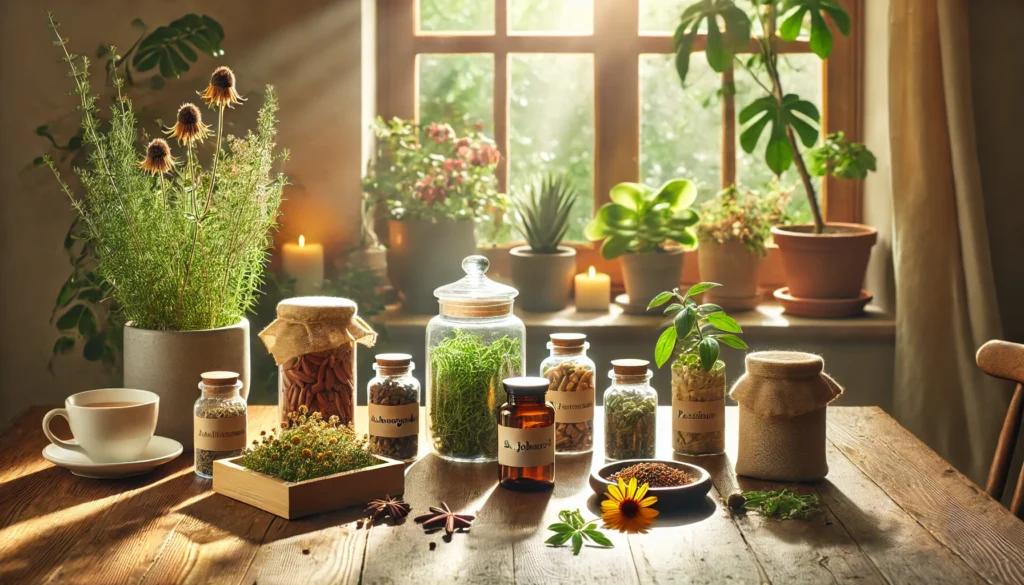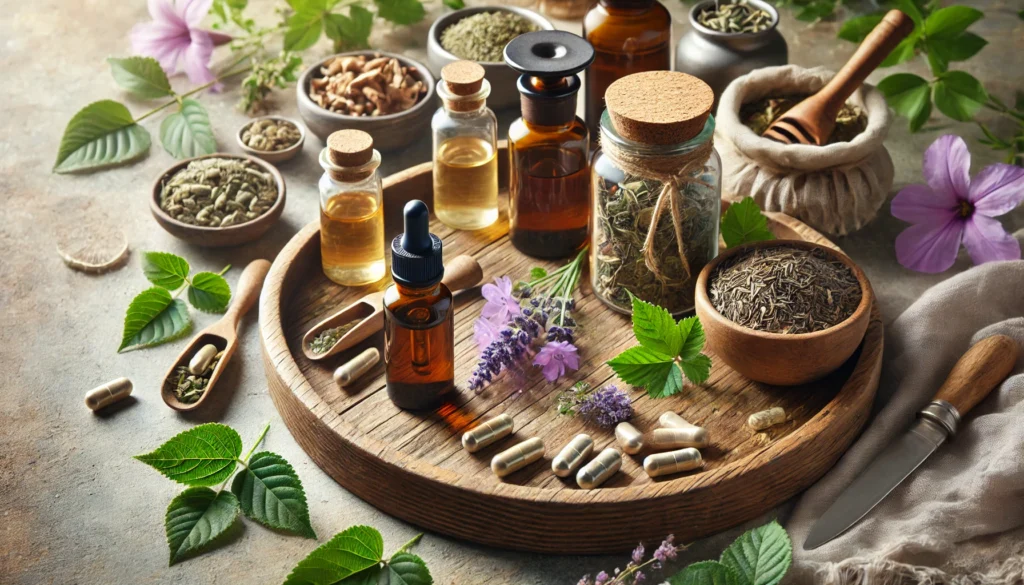Understanding the Rise of Natural Medicine for Mental Health
In recent years, there has been a significant shift in public interest toward holistic and integrative approaches to managing mental health. This growing awareness is not merely a passing trend but reflects a deeper, more widespread realization: traditional treatments such as pharmacological medications and cognitive behavioral therapy, while essential, are not always sufficient or suitable for everyone. More individuals are now exploring natural medicine for mental health, seeking alternatives that align with their values, support their bodies gently, and minimize side effects. This interest is especially pronounced among adults who are looking for ways to enhance emotional balance without becoming dependent on pharmaceuticals.
You may also like: Best Herbal Alternatives to Anxiolytics: Natural Remedies for Anxiety Relief
Natural medicine for mental health refers to a broad spectrum of approaches, including the use of herbal remedies, dietary supplements, adaptogens, lifestyle modifications, and mind-body practices. These options are often pursued either as standalone treatments for mild to moderate emotional distress or as complementary therapies in conjunction with more conventional psychiatric care. What differentiates this approach is its emphasis on the body’s inherent capacity to heal and self-regulate. Rather than suppressing symptoms, natural therapies often aim to address underlying imbalances, nourish the nervous system, and restore overall vitality.
Holistic strategies consider the interconnectedness of physical, emotional, and psychological health. For example, chronic inflammation, nutritional deficiencies, hormonal dysregulation, and gut microbiota imbalances are increasingly recognized as factors that may influence mental well-being. Addressing these elements through targeted natural remedies for mental health may lead to meaningful improvements in mood, energy, focus, and resilience. Moreover, holistic care emphasizes prevention and lifestyle optimization, empowering individuals with the tools to build long-term mental resilience.
This article will explore a range of herbs for mental health, adaptogenic compounds, and holistic supplements that show promise in supporting emotional wellness. It will also discuss the scientific rationale behind their use, offer practical guidance for safe implementation, and highlight key considerations to ensure that readers make informed, evidence-based decisions.

The Science Behind Herbs for Mental Health: Ancient Wisdom Meets Modern Research
The use of herbs for mental health is deeply rooted in traditional healing systems such as Ayurveda, Traditional Chinese Medicine (TCM), and Western herbalism. These ancient systems have long employed botanicals to calm the mind, uplift the spirit, and balance the body. What was once considered anecdotal is now increasingly backed by modern clinical studies, pharmacological investigations, and peer-reviewed research.
One example is Rhodiola rosea, an adaptogenic herb traditionally used in Russian and Scandinavian medicine to enhance mental endurance and reduce fatigue. Scientific studies suggest that Rhodiola may help modulate the stress response by affecting levels of cortisol and serotonin. Another widely researched herb is Withania somnifera, commonly known as ashwagandha. Extensively studied for its anxiolytic and neuroprotective effects, ashwagandha appears to reduce cortisol levels and promote a sense of calm without sedation.
Passiflora incarnata (passionflower) and Valeriana officinalis (valerian root) are often used to alleviate symptoms of anxiety and insomnia. Passionflower is thought to work by increasing gamma-aminobutyric acid (GABA) levels in the brain, leading to reduced neural activity and a calming effect. Valerian root, often referred to as a natural alternative to benzodiazepines, has been shown to improve sleep quality and reduce tension.
These botanicals often possess complex phytochemical profiles, including alkaloids, flavonoids, and terpenes, which interact with various neurotransmitter systems such as serotonin, dopamine, and GABA. Unlike synthetic medications that target a specific receptor or enzyme, herbs tend to exert a broader regulatory influence, offering multifaceted benefits. This holistic action may account for their effectiveness in improving mood, enhancing cognition, and reducing stress-related symptoms.
Importantly, the growing body of research into herbs for mental health reflects the integration of empirical evidence with historical wisdom. As researchers continue to unravel the molecular mechanisms of these botanicals, the credibility of natural remedies for mental health increases, making them viable options within evidence-based integrative care.
Adaptogens and Emotional Balance: The Role of Stress-Modulating Botanicals
Adaptogens represent a unique class of herbs known for their ability to help the body adapt to stress and restore homeostasis. Unlike stimulants, which increase energy at the cost of eventual depletion, adaptogens are non-toxic and work by enhancing the body’s resilience to physical, emotional, and environmental stressors. These herbs may play a critical role in supporting emotional wellness, especially in our fast-paced, high-stress modern world.
Among the most studied adaptogens is Panax ginseng, which has been used for centuries in East Asian medicine. Clinical trials have demonstrated its capacity to improve mood, reduce fatigue, and enhance mental performance. Ginseng is thought to influence the hypothalamic-pituitary-adrenal (HPA) axis and modulate levels of key neurotransmitters, including dopamine and norepinephrine.
Another prominent adaptogen is Eleutherococcus senticosus (Siberian ginseng), which has been shown to reduce symptoms of burnout and improve vitality. Its action is believed to involve enhancing mitochondrial function, supporting adrenal health, and increasing the body’s ability to manage cortisol. These effects are particularly beneficial for individuals experiencing chronic stress, emotional exhaustion, or mental fog.
Schisandra chinensis, known as the “five-flavor berry,” is prized in Traditional Chinese Medicine for its harmonizing effects. It has been found to support liver detoxification, increase endurance, and sharpen mental clarity. Schisandra’s adaptogenic and antioxidant properties make it especially relevant for individuals coping with mental fatigue and emotional overload.
These stress-modulating herbs are increasingly regarded as natural medicine for mental health due to their unique ability to support the neuroendocrine system. When used judiciously and with professional guidance, adaptogens can offer a foundational layer of support for individuals navigating anxiety, burnout, or mild depressive states. Their cumulative, non-habit-forming benefits make them a compelling alternative to synthetic interventions.

Nutritional Psychiatry and the Role of Holistic Supplements
The emerging field of nutritional psychiatry emphasizes the link between diet, nutrient status, and mental well-being. While food remains the foundation of good health, many people struggle to meet their micronutrient needs due to modern dietary patterns, stress, and environmental exposures. In this context, holistic supplements serve as adjuncts to help optimize brain health and emotional stability.
Omega-3 fatty acids, particularly eicosapentaenoic acid (EPA) and docosahexaenoic acid (DHA), are among the most extensively researched nutrients for mental health. These essential fats are integral to neuronal membrane fluidity and have anti-inflammatory properties that may reduce symptoms of depression. Meta-analyses have consistently shown that omega-3 supplementation can benefit individuals with mood disorders, especially when EPA is present in higher ratios.
B-complex vitamins, especially B6, B9 (folate), and B12, play critical roles in neurotransmitter synthesis and methylation pathways. Deficiencies in these vitamins have been linked to depression, cognitive decline, and emotional instability. Supplementation with bioavailable forms such as methylfolate and methylcobalamin may help correct imbalances and support mental clarity. This is particularly relevant for individuals with genetic variations like MTHFR polymorphisms that impair folate metabolism.
Magnesium is another essential mineral involved in over 300 biochemical reactions, including those governing nervous system function. Studies have found that magnesium supplementation can help reduce anxiety symptoms and promote better sleep. Its calming effect on the central nervous system is thought to involve the regulation of NMDA receptors and the inhibition of stress-related hormones.
These holistic supplements, while not a cure-all, contribute to a well-rounded approach to emotional wellness. By addressing underlying nutritional deficiencies and supporting neurochemical balance, they enhance the effectiveness of other lifestyle strategies and herbal remedies for mental health. A growing number of integrative psychiatrists now include targeted supplementation as part of personalized treatment plans.
Frequently Asked Questions (FAQ)
What are some lesser-known herbs that may support emotional health naturally? While well-known herbs like ashwagandha and valerian are often discussed, there are many lesser-known botanicals gaining attention in integrative health circles. Bacopa monnieri, traditionally used in Ayurvedic medicine, has shown promise in improving cognitive function and reducing anxiety by modulating serotonin levels. Saffron, more commonly associated with cuisine, has antidepressant effects comparable to conventional medications in some studies. Another emerging herb is Albizia julibrissin, also called the “tree of happiness” in Traditional Chinese Medicine, used for calming agitation and mood swings. Exploring these herbs for mental health with professional guidance can be a rewarding part of your wellness strategy, especially when seeking natural medicine for mental health that extends beyond mainstream options.
Can natural remedies for mental health be used alongside prescription medications? Yes, many individuals incorporate natural remedies for mental health as adjunct therapies to conventional medication, often under the supervision of a qualified healthcare provider. However, this combination must be carefully managed, as some herbs can interact with pharmaceuticals. For instance, St. John’s Wort may reduce the effectiveness of antidepressants or interfere with birth control. On the other hand, magnesium, omega-3 fatty acids, and certain adaptogens tend to complement conventional treatment without significant interactions. The safest and most effective approach involves a personalized plan that integrates herbs for mental health alongside medical supervision and regular monitoring.
Are there emotional benefits to seasonal herbal protocols? Absolutely. Integrative practitioners often recommend rotating herbal protocols based on seasonal shifts to align with the body’s natural rhythms. For example, nervine herbs such as chamomile or lemon balm may be more suitable in the high-energy months of spring and summer, while warming adaptogens like reishi or ashwagandha provide grounding support in the winter. This practice is rooted in traditional healing philosophies and supports a broader, cyclical understanding of natural medicine for mental health. Tailoring your herbal routine to the seasons can help sustain emotional resilience and reduce mental fatigue that may result from chronic stress or seasonal affective patterns.
How do natural remedies for mental health influence long-term emotional resilience? Natural remedies for mental health often work gradually, nourishing the nervous system over time and helping the body restore its capacity to self-regulate. This is particularly important for building emotional resilience, which involves more than symptom suppression—it requires cultivating inner balance, physiological stability, and stress tolerance. Adaptogens like holy basil and reishi not only calm acute anxiety but also support adrenal health and immune modulation over weeks or months of consistent use. Unlike pharmaceutical solutions that may offer short-term relief but foster dependency, herbs for mental health contribute to long-lasting wellness when paired with lifestyle practices like sleep hygiene and regular movement.
Are there any psychological risks in relying solely on herbal approaches? While natural remedies for mental health can be highly effective, relying solely on them without professional oversight may carry risks, especially in cases of severe depression, bipolar disorder, or schizophrenia. One psychological risk is delayed access to appropriate care if herbal interventions are prioritized over necessary medical treatment. Additionally, self-diagnosis and inconsistent dosing can lead to underwhelming results or even harm. Responsible use of herbs for mental health involves understanding both their capabilities and limitations. Holistic support should ideally integrate mental health counseling, social support systems, and, when needed, evidence-based medical care to ensure comprehensive treatment.
Can children or teens safely use natural medicine for mental health support? There is a growing interest in pediatric integrative medicine, and some natural remedies for mental health may be appropriate for children or adolescents when prescribed by a qualified practitioner. Herbal options such as lemon balm, chamomile, or magnesium glycinate are sometimes used to reduce restlessness or improve sleep. However, children are not just small adults; their physiology and brain development require extra caution. Dosages must be carefully calibrated, and the long-term effects of certain herbs for mental health in youth populations remain under-studied. A licensed integrative pediatrician or naturopathic doctor can guide safe and effective use in younger populations.
How do cultural traditions influence the choice of herbs for mental health? Cultural heritage plays a significant role in the selection and interpretation of herbs for mental health. For instance, Traditional Chinese Medicine emphasizes harmonizing the flow of qi using formulas that address both emotional and physical blockages. In contrast, Ayurvedic systems focus on balancing doshas and restoring energetic equilibrium through herbs like gotu kola and shankhpushpi. Indigenous healing traditions across the Americas use sacred botanicals such as cacao and blue vervain for emotional healing. Understanding these traditions can deepen our appreciation for natural medicine for mental health and encourage a more inclusive, culturally sensitive approach to care.
What role do ritual and intention play in using herbal medicine for emotional well-being? Beyond their biochemical actions, herbs for mental health are often most powerful when used with ritual and intention. In many traditions, making herbal teas or tinctures is part of a mindful practice that invites presence, reflection, and emotional processing. Engaging the senses—through aroma, taste, and texture—can reinforce the brain’s relaxation response and amplify the effects of natural remedies for mental health. While clinical data may not quantify the impact of ritual, emerging research in psychoneuroimmunology suggests that belief and intention can shape the nervous system’s response to therapeutic interventions. Integrating ritual into your healing process can enhance both efficacy and personal connection to your chosen remedies.
Are there specific herbs that support creativity and emotional expression? Yes, some herbs for mental health not only reduce anxiety or depression but also open pathways for creativity and emotional expression. Skullcap and damiana, for instance, are sometimes used to ease nervous tension while supporting sensual and imaginative vitality. Cacao, when consumed ceremonially or in moderate doses, is known to promote heart-opening sensations and stimulate dopamine release, fostering inspiration. These herbs may be particularly useful for artists, writers, and others who rely on emotional fluidity as part of their creative work. As with all natural medicine for mental health, selecting the right herb involves attuning to your specific goals and emotional state.
How might future research transform our understanding of herbs for mental health? The field of botanical psychiatry is expanding rapidly, with new studies exploring the genomic, neurochemical, and epigenetic effects of natural remedies for mental health. Advances in metabolomics and microbiome research are shedding light on how plant compounds influence not only neurotransmitters but also gut-brain signaling and inflammation pathways. Future research may help identify biomarkers that predict individual responses to specific herbs for mental health, paving the way for personalized botanical medicine. In time, we may see integrative protocols become more mainstream in mental healthcare systems, especially as demand grows for safe, sustainable, and non-stigmatizing treatments.

Gut-Brain Axis and the Role of Probiotics in Emotional Health
A fascinating and rapidly expanding area of research in mental health involves the gut-brain axis—the bidirectional communication system between the gastrointestinal tract and the central nervous system. This relationship underscores the importance of digestive health in regulating mood, cognition, and stress response. Probiotics, often termed “psychobiotics” when used for mental health purposes, are gaining recognition for their potential to influence brain function via the gut microbiome.
The human gut is home to trillions of microorganisms that produce neurotransmitters such as serotonin, dopamine, and GABA. Approximately 90% of serotonin, a key mood-regulating chemical, is produced in the gut. Dysbiosis, or microbial imbalance, has been associated with a range of mental health conditions, including anxiety, depression, and even autism spectrum disorders.
Studies suggest that specific probiotic strains, such as Lactobacillus rhamnosus and Bifidobacterium longum, can reduce symptoms of anxiety and improve stress resilience. These strains are believed to modulate the HPA axis, reduce systemic inflammation, and improve intestinal barrier integrity—factors that collectively contribute to emotional well-being. Some clinical trials have even demonstrated comparable results between psychobiotics and standard pharmacological treatments in managing mild depression.
Incorporating probiotics into a natural medicine for mental health strategy requires attention to strain specificity, dosage, and duration. Not all probiotics offer the same benefits, and their effects can vary based on individual microbiota composition. Nevertheless, high-quality probiotic supplements or fermented foods such as kefir, yogurt, kimchi, and sauerkraut may provide tangible benefits when consistently consumed.
The gut-brain connection adds another layer of depth to the conversation around natural remedies for mental health. It reinforces the holistic view that emotional wellness is inseparable from physical health and that restoring internal harmony often involves nurturing the body’s microbial ecosystem.
holistic mental wellness, adaptogenic herbs for stress, brain health supplements, natural anxiety relief, herbal adaptogens for mood, integrative mental health, alternative treatments for depression, plant-based mood support, emotional resilience naturally, botanical supplements for stress, complementary mental health therapies, mind-body wellness, stress-reducing herbs, functional psychiatry, mood support vitamins, gut health and emotions, herbal calming remedies, neuroinflammation and mood, stress response regulation, whole-body mental health
Further Reading:
7 Evidence-Based Natural Mental Health Treatments
Herbs and supplements for depression
Popular Herbal and Natural Remedies Used in Psychiatry
Disclaimer
The information contained in this article is provided for general informational purposes only and is not intended to serve as medical, legal, or professional advice. While NewsHealthWatch strives to present accurate, up-to-date, and reliable content, no warranty or guarantee, expressed or implied, is made regarding the completeness, accuracy, or adequacy of the information provided. Readers are strongly advised to seek the guidance of a qualified healthcare provider or other relevant professionals before acting on any information contained in this article. NewsHealthWatch, its authors, editors, and contributors expressly disclaim any liability for any damages, losses, or consequences arising directly or indirectly from the use, interpretation, or reliance on any information presented herein. The views and opinions expressed in this article are those of the author(s) and do not necessarily reflect the official policies or positions of NewsHealthWatch.

